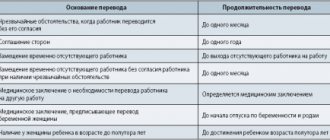Payroll and taxes
04/26/2017 Print
In the list of complex cases of calculating temporary disability benefits, an employee’s return to work during illness is far from the last place. And in terms of the “cunning”, ambiguity and unpredictability of how inspectors and judges react to such situations, he is the undisputed leader.
It seems that even the widespread implementation of electronic sick notes planned for July of this year is unlikely to completely solve this problem. Since a smart electronic machine is not at all obliged to go into moral and ethical subtleties and find out whether the completely ill manager Petrov was ordered by his immediate superior to go to work, or whether Petrov himself found a place for heroism? Was his labor impulse a sincere zeal for the good of the company or is it purely deceitful, in the sense that the ill “workaholic” hopes to receive for his zeal either a normal salary instead of a small allowance, or both?
Important
The time of release from work due to incapacity for work does not apply to rest time. Consequently, work on sick leave is not work on a day off and is not paid double (Articles 107, 152, 153 of the Labor Code of the Russian Federation). If wages are accrued for days worked, then benefits for these days are not due and non-payment will not be a violation of the Labor Code of the Russian Federation.
We do not rule out that everyone was happy about the appearance of the sick Petrov at work - his superiors, his subordinates, and the company's counterparties. Only the accountant, who had to decide how to pay for these labor achievements and miracles of endurance, was upset. Moreover, this decision must coincide with the position of the FSS of the Russian Federation. But the Federal Social Insurance Fund of the Russian Federation believes that it is impossible to legally pay for work during sick leave. So spin, accountant, as you wish.
Since the solution to the problem one way or another lies in the conflict plane, wouldn’t it be easier to “turn around” Petrov at the office threshold and send him for further treatment? You are, they say, dear to us, like a memory, we all love you. Go, dear, drink tea with raspberries and listen to Rosenbaum: to love is to love, to walk is to walk. To be sick is to be sick.
No, it’s not simpler... Petrov, as already noted, could appear not on his own whim - for a long ruble, but, like a gin, at the call of management, who, to answer accounting problems - yeah..., from a high bell tower. Moreover, the employee was most likely not called by any written order, but simply in words. It is quite possible that he was also promised additional compensation. So “forceful methods” do not work here.
In addition, an accountant can find out that a sick employee worked on such and such days after the fact, when he is given the honor of a closed sick leave. In which, by the way, there is no note about violation of the hospital regime, since the “workaholic” Petrov observed secrecy and showed up for doctor’s appointments on time.
Current
If an employee complains during a conflictual dismissal that he was illegally involved in work while ill, and proves this, the employer will be at a loss. The employee can prove this by presenting work documents signed with the dates of illness, or by providing information about the dates and times when the magnetic pass was triggered.
So what should an accountant do? Initiating Petrov into the intricacies of social insurance is also somehow not the time. On the one hand, since a person worked, he was not “disabled for work” and was not entitled to benefits. But these are all high words. Such arguments can be brought to the FSS, but to Petrova, by and large, yeah... the same thing, from a high bell tower. He has sick leave in his hands and it is impossible to brush aside this fact by paying the sick Petrov the traditional salary, as it is impossible for the healthy Petrov. More precisely, perhaps, but this fact may come back to haunt us in the future. In court, for example, where unpaid sick leave can be a good argument. Or during inspections where discrepancies in working time recording are revealed.
Another option - to pay benefits instead of wages - is also, to put it mildly, not without its drawbacks. An employee who received a small allowance for days worked instead of a large salary can file a complaint with the labor inspectorate. And there will be evidence that the employee worked like in the galleys. In general, as was said, the problem is the problem.
And there’s another moment that should cause a “headache” not for the accountant, but for the director: even manager Petrov, who sits on a chair all day at the computer, can, as they say, “get sick.” What if Petrov works not as a manager, but as a turner? After all, if something happens to him at the workplace, this is already a work-related injury, with all the ensuing negative consequences for both himself and his employer. And if, as a result of being called to work, an employee on sick leave experiences a complication of his illness, he can try to obtain compensation from the organization for damage to his health (Articles 22, 232, 233, 237, 220 of the Labor Code of the Russian Federation).
Vague explanations
Regardless of the reasons for going to work (an urgent request from the employer, one’s own initiative due to the objective need to submit a report), the question arises: how to pay for working days and sick leave in this case? Is it possible to pay both amounts, or do I need to choose one? Is going to work during a period of temporary incapacity a basis for refusing an employee both sick leave and wages?
One of the organizations asked a similar question to the Russian Ministry of Finance, describing in detail the current circumstances. They were as follows.
The employee was issued a certificate of incapacity for work for the period from February 2 to February 27. However, from February 2 to February 6, the employee was at the workplace, as evidenced by the time sheet and the results of the work performed. In what order should temporary disability benefits be paid to an employee?
The organization considered two options:
- pay benefits for the entire period from February 2 to February 27 in accordance with the law of December 29, 2006 No. 255-FZ;
- pay wages for the period from February 2 to 6 and benefits only from February 7 to 27.
In this regard, an additional question arose: is it possible to take into account the salary paid to an employee for the period from February 2 to February 6 as expenses when calculating the tax base for income tax?
Despite the clear formulation of the question, representatives of the financial department answered it vaguely, citing only general standards (see letter of the Ministry of Finance of Russia dated June 4, 2012 N 03-03-06/4/57). Therefore, policyholders have to look for options to resolve this problem on their own.
So, even those who have never encountered it before can now imagine the scale of the problem. Paying only benefits in such a situation is risky. Not paying it at all either. Etc. and so on. In general, no matter where you throw it, everything is a wedge. Now let's talk about ways to minimize risks. None of them is a panacea, but each in a specific situation is capable, if used skillfully, of becoming a kind of “shock absorber.”
Time for an employee to return to work after sick leave on a shift schedule
Viktoriya Kochetkova. expert October 24, 2014, 10:32
This point should be discussed with the employer. In general, if you have a shift since October 23, 2014, and during this period you were still on sick leave, then you could not return to your work shift. But whether you go to work on October 24, 2014 at 12:00 pm is a matter that needs to be resolved with the employer, as it is indicated in local regulations for such cases. But, in general, your shift is just a day, i.e. 23.10. and 24.10. But it turns out that you are not taking over for a day, i.e. not in accordance with the schedule, and it would be more logical for you not to leave on October 24, 2014.
Therefore, contact your employer. And one more thing, if you have organized delivery to work using your employer’s transport, then how will your delivery be organized on 10/24/2014 by 24-00.
Viktoriya Kochetkova. expert October 24, 2014, 11:24
Let the employer provide a local regulatory act, I think these are the Internal Labor Regulations, where such situations are taken into account, because the question may not only be about a certificate of incapacity for work, but also about leaving the vacation; the vacation may also end in the same way.
You know, Article 57 of the Labor Code of the Russian Federation prescribes that the employment contract must indicate:
working hours and rest hours (if for a given employee it differs from the general rules in force for a given employer);
Article 91 of the Labor Code of the Russian Federation determines that Working time is the time during which an employee, in accordance with the internal labor regulations and the terms of the employment contract, must perform labor duties.
Those. The start time of the work shift and the end time are indicated.
And it turns out that for some reason you must, after leaving the certificate of incapacity for work, go to your work shift not at 9:00, as indicated in your TD, but at 24:00 on another working day. And it turns out that your certificate of incapacity for work falls precisely at the beginning of your work shift, i.e. It is logical that you cannot go to this work shift, you have a certificate of incapacity for work, and your work shift is from 9-00 to 9-00 the next day. You cannot work this shift because... you have a certificate of incapacity for work.
"Just don't let him in!"
Turning around at the door, as already mentioned, will not work, since an accountant is not a school security guard. In such situations, labor inspectors offer a wide range of influence on sick employees who are eager to work: from preventive “heart-to-heart” conversations (if sick leave is open, then at least you go out, even if you stay at home, but you won’t get paid), to informing the medical institution about the employee’s violation of sick leave mode. As an option, it is proposed to ask the employee who is determined to work on sick leave to go to the clinic and close the sheet.
Labor inspectors, by the way, recommend enshrining the ban on going to work while on sick leave in a local regulatory act, providing for liability for violation. True, it is slightly confusing that in Article 76 of the Labor Code of the Russian Federation, which contains a list of grounds for removal from work, there is no such basis. And in the event of an illegal deprivation of an employee’s opportunity to work, the employer is obliged to compensate him for the earnings he did not receive (Articles 234, 139 of the Labor Code of the Russian Federation). So there are no guarantees that inspectors will not one day hold you accountable for following their own semi-official recommendations
In general, this whole technique seems quite flimsy. In addition, it is not designed for cases when the patient goes to work at the behest of management.
Although, in general, an employee’s consent to work with an open sick leave does not in any way affect the issue of the legality of such work, whether he voluntarily went to work or was forced to work - he cannot work on sick leave.
Accountant as a wizard
Of course, no one can prove punishable “forced labor” here - the boss, a kind soul, did not force, but only urgently asked. And he promised to reward. The accountant will have to figure out how to formalize what was promised. It is possible, in agreement with management, to provide him with financial assistance. This most likely will not raise unnecessary questions. You can also give bonuses, but only in a more careful manner. And in any case, not for the period in which the person was mostly absent from work, but for the next one. Otherwise, the validity of bonuses as tax expenses may be questioned.
On a note
In many companies, they simply do not show on the timesheet the attendance at work during sick leave; they pay benefits in full for all the days indicated on the sheet, and the days worked, by verbal agreement with the employee, are compensated for in some other way (for example, financial assistance, bonus). The use of this method is fraught with conflict situations with inspectors.
You can compensate for working on sick leave with subsequent days off. After the sick leave is closed, attendance is entered on the report card for the number of days worked on sick leave, and wages are calculated for these days, and the employee rests on these days. Yes, the methods are “grayish”, but where do you tell them to go?
And finally, a radical, somewhat expensive, but more “streamlined” option for compensating the employee for time off during illness is to return sick leave to the employee, not to show sick leave on the time sheet at all, and to pay the usual salary for the entire period of sick leave. It is acceptable if the sick leave is long, but only a few days have been worked.
Or, if the company has such a practice, pay for work during sick leave by adding money “in the envelope.” Oh, wait, what are we talking about!.. We cross out this method as not having anything to do with the law.
Returning to work on the night shift after sick leave
Colleagues, I need your opinion (I’ll keep mine to myself for now)
This situation is a shift work schedule - two shifts a day from 09.00 to 21.00, one day off, then two shifts a night from 21.00 to 09.00, resulting in three days off.
The work schedule (shifts) is drawn up in this way - May 27 and 28 are marked "N" - night shift from 21.00 to 09.00 the next day, at the bottom of the schedule there is a decoding of the designations and the start and end times of work and breaks. The employee is familiarized with the schedule and signed, meaning the schedule is approved by the general manager.
The employee brought in sick leave and will begin work on May 29, 2015.
Does an employer have the right to require an employee to go to work from 00.00 to 09.00 on May 29, 2015?
I also ask you to take into account that the employment contracts with employees stipulate the obligation to transport personnel to and from the place of work from city A. The bus leaves city A at 19.30, public transport does not operate.
May 27 and 28 are marked “N” - night shift from 21.00 to 09.00 the next day,
And what, the requirement for at least double the duration of rest after a shift in your organization is not observed when drawing up a schedule? It's a pity.
Apply for an appearance
Let’s say that out of 12 days of illness, an employee devoted 4 days to work. The very fact of working these days is already a sufficient basis for calculating wages, so there is no need to write any additional statements. Attendance must be entered on the report card for each day of sick leave worked. The remaining days after presentation of the sheet are noted as days on sick leave. Both cannot be indicated in one day. On sick leave, in the column “Benefits are due for the period: from... to...” you need to indicate only the period of incapacity for work during which the person did not go to work. If you worked several days in a row at the end or beginning of sick leave, this is not a problem. If the worker was in the middle of the sick leave, then you should indicate in this column the entire period of sick leave from the first unworked day until going to work, after which the sheet was closed, and an explanation about the fact that benefits are not due for all these days should be given in the attached calculation.
The first three days of illness, which, according to Part 1 of Clause 2 of Article 3 of Law No. 255-FZ, are paid at the expense of the employer, can be determined as follows: for example, an employee worked on the first and third days of sick leave. Then the organization pays benefits for the second, fourth and fifth days at its own expense, and the subsequent unworked days come from the funds of the Social Insurance Fund of the Russian Federation.
Returning to work after sick leave
After completion of treatment, the patient is given a sick leave certificate. .
On the first day after leaving sick leave, you must provide a certificate of incapacity for work to the accounting department of the organization where you work. Based on this document, the employer will make calculations and pay sickness benefits.
If during the period while you were sick you were issued several sick leaves . then all of them must be transferred to the employer.
Short Game
The most difficult situations arise if the employee went to work only on certain days, that is, he still “sicked” part of the sick leave, and worked part of it. On the one hand, in accounting and tax accounting it is necessary to reflect those transactions that were actually performed. This means, logically, only wages should be accrued for the time worked, and benefits should be accrued for the time that the employee was actually undergoing treatment and did not work.
Letter of the law
The ability to take paid sick leave is a guarantee provided for in Article 183 of the Labor Code of the Russian Federation). Allowing an employee on sick leave to work is a violation of labor laws.
Moreover, strictly speaking, the amount of the benefit should depend on specific circumstances. If an employee worked at the beginning of a period of temporary disability (as, for example, in the situation described in the above letter from the Ministry of Finance of Russia), then there was a violation of the regime, and, therefore, payment for those sick days when the employee did not go to work should be based on Minimum wage (taking into account the regional coefficient). But if at first the employee was sick (he received treatment and did not go to work), and at the end of the sick leave he returned to work, those days of illness that preceded the violation of the regime (going to work) must be paid in full according to the general rules, because the reduction benefits due to violation of the regime are made only from the date of violation.
But, as has already been emphasized, it is the health worker, not the employer, who must mark the violation of the regime. If the employer, contrary to the advice of Rostrud of the Russian Federation, does not inform the medical institution that the employee is going to work, there will be no marks on the sick leave. Therefore, formally, the employer has no grounds for reducing the amount of benefits. Although, as already emphasized above, the judges may well conclude that he was nevertheless obliged to calculate benefits based on the minimum wage, since he knew for sure that a violation had taken place.
So, with a 99.9% probability we can assume that our “workaholic” will not have any marks of violation of the hospital regime. Is it necessary to reduce benefits if days were worked at the beginning or in the middle of sick leave? The FSS will most likely answer this question (if you ask it for some reason) in the affirmative. But from the courts, if someone upset by this turn of events complains against you, you can expect anything. In particular, the verdict that without a doctor’s note about a violation of the regime, the employer does not have the right to reduce benefits, even if he knows about the violation (decision of the Zheleznodorozhny District Court of Ulyanovsk dated January 23, 2015 No. 2-47/2015(2-2811/2014;) ~M-2733/2014; Lomonosovsky District Court of Arkhangelsk dated January 22, 2015 No. 2-142/2015(2-4475/2014;)~M-4441/2014; appeal rulings of the Court of the Yamalo-Nenets Autonomous District dated February 10, 2014 No. 33-242/2014).
So the employer has complete freedom of action in this regard with a whole bunch of all sorts of consequences. We choose the “best of the worst”. For example, we are guided by the position of the courts and do not reduce it. However, there is a possibility that the FSS will do this on its own - refusing to reimburse you.
By the way, do not forget about the resolution of the Presidium of the Supreme Arbitration Court of February 14, 2012 No. 14379/11, which states that even if there is a mark on the sheet, the employer is obliged to reduce the benefit only if the reason for the violation is not valid. The senior arbitrators, in turn, referred to paragraph 1 of part 1 and part 2 of article 8 of Law No. 255-FZ. Respectfulness is determined not by the FSS, but by the manager on the basis of the conclusion of the social insurance commission created in the organization or, if the company is small, individually (clauses 1.1-1.3 of the Model Regulations, approved by the FSS 15.07.94 No. 556a; clause 10 of the Regulations, approved by the Resolution Government dated 12.02.94 No. 101). In general, we keep in mind the decision of the senior arbitrators and look for a valid reason for not reducing it. And, of course, we find it (the difficult financial situation of the employee, the presence of young children, etc.). This option will not completely insure against a dispute with the fund, but it may possibly reduce its likelihood.
A reduction, while insuring against disputes with funds, can provoke a conflict with an employee. An employee who does not agree with the reduction can either complain to the labor inspectorate (they will not accrue additional benefits, but use the complaint as a reason for an inspection) or go to court.
There is also a compromise option: reduce the benefit for offset (reimbursement) at the expense of the Federal Social Insurance Fund of the Russian Federation, and give the employee a full benefit, paying the difference from the organization’s funds. True, insurance premiums will have to be charged on the amount of the “addition” - just like a payment to an employee within the framework of an employment relationship.
How can an employee confirm his absence from work due to illness?
Many of us get sick while performing our official duties. At the same time, some endure the disease “on their feet”, go to work, while others use their right and take sick leave .
An important point is the date from which you were not at work . It must coincide with the date indicated on the sick leave certificate. If there is a discrepancy of at least one day, the employer has the right to dismiss such an employee for absenteeism, and the explanation “I was sick at home” is not taken into account.
External alignment
Please note: all this time we were talking about full-time employees working only in one organization. A part-time worker can create even bigger problems. Here, for example, is the following situation: an employee worked in one organization and part-time in another company. He took sick leave and did not go to work at the main organization during the period indicated on it, but he worked for another employer (part-time) as usual. But no notes on violation of the regime were made on the certificate of incapacity for work.
This fact was revealed during an inspection by the Federal Social Insurance Fund of the Russian Federation - after the sick leave was presented and paid for by the “main” employer. The fund qualified such actions of the employee as a violation of the regime and, despite the absence of a corresponding note from the attending physician on the sick leave, it considered that the amount of benefits at the main place of work should have been reduced (and, as a result, did not accept part of the benefits paid).
But the main employer believed that since at the time of payment he did not know and could not know about the violation of the regime, he legally paid sick leave on the basis of the documents presented by the employee and the entire amount should be offset.
The court concluded that the Federal Social Insurance Fund of the Russian Federation quite rightly did not take into account the costs of paying part of the benefit (i.e., the difference between the accrued amount and the amount that was due to the employee taking into account the reduction in the amount of benefits in accordance with Article 8 of Law No. 255-FZ).
Facts of abuse of his rights by the insured person were established (he actually worked for another employer during the period of sick leave and, therefore, violated the regime). This means that the costs of paying sick leave in such a situation were incurred by the insurer in violation of the norms of the current legislation (Resolution of the Federal Antimonopoly Service of the Ural District dated April 20, 2011 No. F09-1302/11-C2.
This is, of course, unfair. The employer does not know that the employee is working somewhere else while on sick leave, and he does not have the authority to obtain this information. And he is obliged to pay the sick leave presented to him
Of course, if judges are so strict with the main employer in cases where its employee violated the regime by going to work part-time during illness, they will clearly not show leniency in a situation where the employee, while on sick leave, goes to his main job .
Moreover, in this case it will no longer be just a matter of violating the regime and the need to reduce the amount of benefits, but generally about not assigning benefits to the employee. After all, in fact, going to work during illness means that the employee has not lost either his ability to work or his earnings.
Based on the foregoing, several important conclusions can be drawn:
a) it’s better not to get sick;
b) if you are sick, stay in bed.
Accountants, due to the lack of adequate explanations on this issue, should be advised to rely on common sense, arbitration practice, intuition and the instinct of self-preservation
And as a bonus, let us recall the general rules for calculating sick leave. Yes, just in case.
What difficulties may arise when returning from sick leave?
Recently, many employees are faced with the problem of correctly filing a certificate of incapacity for work. Returning to work after sick leave must be accompanied by a correctly issued certificate of temporary incapacity for work .
An error in the name of the organization in which the employee works can cause difficulties in making changes to the sick leave. This document is a strict reporting form . and no one will write you a new sick leave to replace the damaged one.
To avoid these difficulties, it is important when your attending physician fills out a sick leave form to provide the correct name of the company where you work. Also ensure that the appropriate seals of the treating institution are affixed to this document .
If, due to being on sick leave, you have difficulties with your employer . You always have the right to seek help from lawyers who will help protect your rights.










